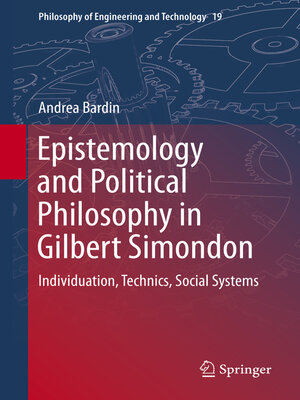Epistemology and Political Philosophy in Gilbert Simondon
ebook ∣ Individuation, Technics, Social Systems · Philosophy of Engineering and Technology
By Andrea Bardin

Sign up to save your library
With an OverDrive account, you can save your favorite libraries for at-a-glance information about availability. Find out more about OverDrive accounts.
Find this title in Libby, the library reading app by OverDrive.



Search for a digital library with this title
Title found at these libraries:
| Library Name | Distance |
|---|---|
| Loading... |
This combination of historiography and theory offers the growing Anglophone readership interested in the ideas of Gilbert Simondon a thorough and unprecedented survey of the French philosopher's entire oeuvre. The publication, which breaks new ground in its thoroughness and breadth of analysis, systematically traces the interconnections between Simondon's philosophy of science and technology on the one hand, and his political philosophy on the other.
The author sets Simondon's ideas in the context of the epistemology of the late 1950s and the 1960s in France, the milieu that shaped a generation of key French thinkers such as Deleuze, Foucault and Derrida. This volume explores Simondon's sources, which were as eclectic as they were influential: from the philosophy of Bergson to the cybernetics of Wiener, from the phenomenology of Merleau-Ponty to the epistemology of Canguilhem, and from Bachelard's philosophy of science to the positivist sociology and anthropologyof luminaries such as Durkheim and Leroi-Gourhan. It also tackles aspects of Simondon's philosophy that relate to Heidegger and Elull in their concern with the ontological relationship between technology and society and discusses key scholars of Simondon such as Barthélémy, Combes, Stiegler, and Virno, as well as the work of contemporary protagonists in the philosophical debate on the relevance of technique. The author's intimate knowledge of Simondon's language allows him to resolve many of th
e semantic errors and misinterpretations that have plagued reactions to Simondon's many philosophical neologisms, often drawn from his scientific studies.






